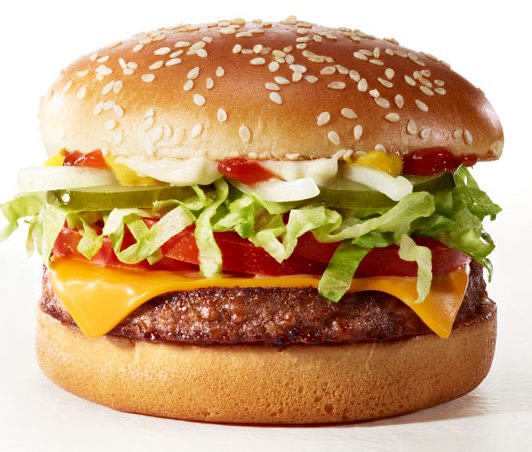I’m holding a sesame seed bun stuffed with tomato, lettuce, pickles, onion, ketchup, mustard, mayo, American cheese, and a classic-looking burger patty: This is the McDonald’s McPlant burger, and it looks a lot like the Quarter Pounder with Cheese Deluxe—although the patty is made from ingredients, such as peas, rice, and potatoes. With the caveat that I’ve been a vegetarian for a long time, I think that it also tastes like the version made from meat.
McDonald’s isn’t the first major fast food chain to offer a plant-based burger—Burger King started rolling out the Impossible Whopper nationally in 2019. But the McPlant, made with Beyond Meat, and now available across the U.K. and testing in the U.S. and a handful of other markets, has the potential to make a meaningful difference in meat consumption.

[Photo: McDonald’s]
“Because of its reach and its revenue—McDonald’s has more locations and sales than any other restaurant chain in the world—McDonald’s could be a huge part of democratizing plant-based meat,” says Emma Ignaszewski, corporate engagement project manager at Good Food Institute, a nonprofit that studies the alternative-meat industry.“McDonald’s is investing its brand equity in the McPlant platform, the same brand equity that it invested in the McNugget in the 1980s that led to the popularization of the chicken nugget,” she says. “McDonald’s has scaled the hamburger, the chicken nugget, the breakfast sandwich, and French fries. When they launch a new product, they’re not looking for short-term gains, they’re looking to define a new category, and this is their opportunity to revolutionize the world’s access to plant-based meat.”
The company said on background that it’s approaching the plant-based market “judiciously.” Another collaboration with Beyond Meat, called the P.L.T., was tested in a small number of restaurants in Canada in 2019 but didn’t scale up. The McPlant, which McDonald’s says took several years of R&D and internal testing—the company wouldn’t share details about the product development, nor how it’s different from Beyond Meat’s other products—was introduced in late 2020 as a “core menu option” that individual markets could choose to offer when ready. Restaurants in Denmark and Sweden started testing it in early 2021. In the U.K. and Ireland, after tests that started last fall, the burger was permanently added to menus this January.
In the U.S., a small-scale test began in eight restaurants in 2021 to see how adding the burger affected operations in kitchens. While it remains to be seen how many Americans will choose plant-based burgers over meat, early sales were promising. “In December, sales of McPlant burgers in participating locations were hitting 70 per outlet per day, about triple some analysts’ predictions,” says Ignaszewski. An average McDonald’s sells 110 Big Macs a day. An expanded test now, in 600 restaurants in the Bay Area and around Dallas-Fort Worth, is gathering more data about customer demand.
McDonald’s aims to reach net zero emissions by 2050; while it’s pursuing strategies like regenerative agriculture, it’s hard to imagine that the goal is achievable unless more customers reduce their consumption of beef, which has the highest carbon footprint of any food. The company doesn’t frame the McPlant as a way to convince customers to eat less meat, but as a way to offer more choices. Still, if the new burger becomes widely available, and if McDonald’s also scales up plant-based chicken, plant-based pork, and other alternatives, its carbon footprint will start dropping, if even a fraction, if its customers make the switch. McDonald’s doesn’t share data about its burger sales, but Americans order nearly 9 billion burgers a year overall, many from the fast food chain.
“Launching the McPlant is a major inflection point for alternative proteins—not only for food service, but also for retail, as the McPlant provides consumers a new opportunity to try a plant-based product in a familiar, convenient setting,” says Ignaszewski.








































